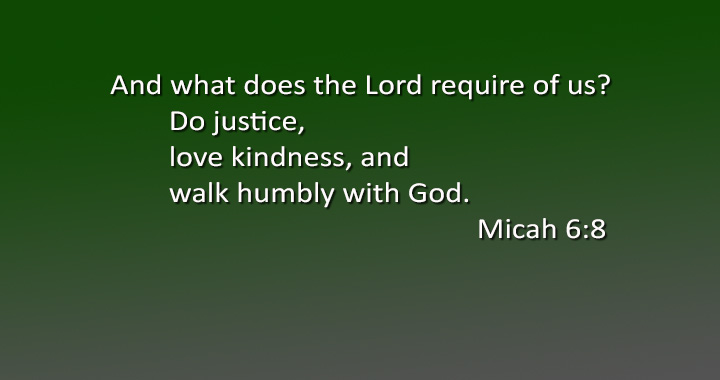October 18, 2020
And what does the Lord require of us? Do justice, love kindness, and walk humbly with God. ~ Micah 6:8
I remember as a young child our family would on occasion go out to eat at another family’s house. My mom or dad would look at my sister and me and say, “Be polite. Eat the food that is served, eat with your mouth shut, put your napkin on your lap, say please and thank you, and whatever you do don’t talk about religion or politics!”
Really Mom and Dad? Do you really think little kids want to talk about religion or politics? Maybe they were just giving us advice for later in life. They knew, and most of us know as well, that religion and politics are not topics we are supposed to talk about in polite company.
Yet, in my recent rounds around town and talking with various people, it seems we are all dying to know how can we talk about our faith and politics? Neighbors struggle to remain friends because they have signs representing different political parties. Brothers and sisters struggle to stay in relationship. Political divisions strain long term family ties. I hear this refrain so often, “It didn’t use to be this way.”
Jim Wallis in his book God’s Politics which was published in 2005 says people are yearning for deeper and richer conversations about religion in public life, about faith and politics. I could not agree more and thank God Wallis did not write his book in 2020!
Is there a healthy way we can talk about the issues that are burning in our souls? Health care, mass shootings in our schools, racism, police brutality, white supremacy, immigration? The list is endless. I have been told many times, “Keep politics out of the church, Craig.” Is this true? Can we separate our faith from our politics?
In the 1930’s, says Reverend Mark Feldmeir, author of A House Divided: A Politics of Compassion, a small group of theologians were concerned about the rise of Hitler and fascism in Germany, and the church remained largely silent. They recognized that the church as well as many people practiced a “dangerous dualism.” Faith is a spiritual matter and politics is a nonspiritual matter. We, the church, tend to compartmentalize things in neat tidy boxes. We separate the flesh from the soul. Heaven from hell and eternal life from this life. And we separate our faith from our politics and there are dire consequences when we do so.
If we desire to follow Christ, that commitment is a claim on all our life and not just an hour of our life on Sunday morning. Feldmeir says we cannot give 100% of our loyalty to any political leader because our complete loyalty is to Christ.
“And what does the Lord require of us? Do justice, love kindness, and walk humbly with God,” (Micah 6:8). Move beyond a thin reading of this well-known verse and ponder its political implications.
Jesus’ first sermon in the Gospel of Luke is a very political platform says Reverend Feldmeir, who is a minister in our conference by the way. Jesus says to “release the captives.” In today’s language is Jesus talking about prison reform? Reexamining our judicial system? Moving from punitive justice to restorative justice? Then Jesus reads about the “recovery of sight to the blind.” Does Jesus care about adequate health care for all? Would He demand quality COVID-19 treatments for the poor and not just the wealthy? Finally, Jesus proclaims “the year of the Lord’s favor,” or a year of jubilee where debts are forgiven. Jesus says we need economic reform. What would He say about the cost of a college education? A living wage? Jesus’ faith informed His politics.
Feldmeir says that all theology is political, but not all politics are theological. “As people of faith, we have an inherent obligation to do politics in the world.” God is not a Democrat, or a Republican says Wallis, but our Trinitarian God does practice the politics of compassion.
What questions do we ask of our political leaders and ourselves about politics of compassion?
Wallis writes in 2005. “We (Christians) will measure the candidates by whether they enhance human life, human dignity, and human rights; whether they strengthen family life and protect children; whether they promote racial reconciliation and support gender equality; whether they serve peace and social justice. Do the candidates’ budget and tax policies reward the rich or show compassion for poor families? (Matthew 25:35-40). Do the candidates’ policies protect the creation or serve corporate interests that damage it? (Genesis 2:15, Psalm 24:1). Do the candidates’ positions on capital punishment, weapons of mass destruction, and pandemics obey the biblical injunction to choose life? (Deuteronomy 30:10).”
Perhaps the Politics of God and the hoped-for politics of our country can be summarized with the words written on the tablet at the base of the Statue of Liberty. “Give me your tired, your poor, your huddled masses yearning to be free…” These are politically charged and compassionate words we can live by. I think Jesus would say, “Amen.”
Blessings and peace,
Craig

